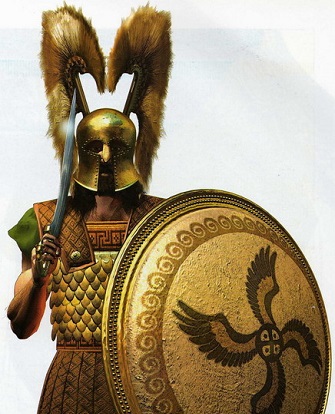
Ancient Greece Facts
Ancient Greece was one of the greatest civilizations the world has ever seen. During it's nearly one thousand years of existence it made important contributions in areas including science, politics, art, and architecture. Some of these accomplishments are known by every kid who ever picked up a history book and others will be less known. On this site you will find pages of interesting information containing lists of ancient Greece facts. You will find answers to such questions as where this great civilization was located, who some of the important people were, what some of their amazing achievements were, and the great wars and battles they were involved in. Below you will find a timeline of the major periods in Greek history.Periods of Ancient Greece Facts
Greek Dark Age (1100 BC - 800 BC)
- The Greek dark age began with the mysterious collapse of the Mycenaean civilizations that had flourished throughout the Peloponnese (a large region in southern Greece) and on numerous Greek islands including Crete.
- Just how the Mycenaean civilization ended is not known. The civilizations cities and palaces were destroyed, and the population suddenly declined. It is speculated that either a huge natural disaster or an opposing army completely wiped them out.
- Little is known about this period in Greek history due to a lack of historical records. We do not know about the daily life of the Greek people during this time or the roles of men and women. It is known that it was a time of confusion in Greece with little in ways of cultural achievements and progress.
Greece Archaic Period (800 BC - 500 BC)
- The word "Archaic" comes from the Greek word archaikos meaning primitive. The art of this period was considered primitive in comparison to the more natural style of the Classical period which was to follow.
- During the Archaic Period a sudden increase in the population on Greece occurred.
- Ancient Greece held the first Olympic Games in 776 B.C.
- During this period strong city-states (polis) such as Athens and Sparta began to emerge.
- This period saw numerous new towns and cities appear and the expansion of older ones.
- This period saw many great conflicts. Here is a list of a few of them:
- First Messenian War (Approximately 750-730 BC)
- Lelantine War (End of 8th century BC)
- Second Messenian War (640-620 BC)
- First Sacred War (595-585 BC)
- Greco-Persian Wars (499 BC - 449 BC)
- Greek-Punic wars (600 BC - 265 BC)
Greece Classical Period (500 BC - 323 BC)
- The Classical period is also called the Hellenic period.
- This period in Greek history made great strides forward in such areas as politics, science, architecture, and art.
- Religion was important to the ancient Greeks. It is believed that Greek mythology with all its famous gods and goddesses started during the beginning of this period.
- During this time Alexander the Great rose to power.
- Perhaps the greatest accomplishment of this amazing time was the development of a form of government called demokratia meaning (democracy) "rule by the people".
- The Peloponnesian War between the city-states of Athens and Sparta broke out.
Hellenistic period (323 BC - 31 BC)
- The Hellenistic Period of Greece began with the death of Alexander the Great in 323 BC.
- The word "Hellenistic" is derived from the Greek word Hellazein meaning to either speak Greek or to identify with the Greeks.
- During this period ancient Greece's progress in areas such as philosophy, art, literature, architecture, and science continued.
- Beautiful pieces of jewelry were made during this period including necklaces, pendants, earrings, and bracelets made out of such materials as gold and silver.
- Due to Alexander the Great Hellenistic kingdoms had spread to Asia and Africa.
- The Battle of Actium in 31 BC marks the end of the Hellenistic Period of Greece. This battle ended a long Roman civil war and enabled Rome to unify and become the dominate power in the region.

ANCIENT GREECE FACTS